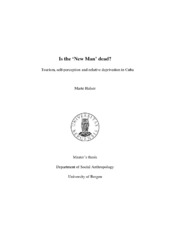Is the 'New Man' dead? Tourism, self-perception and relative deprivation in Cuba
Master thesis
Permanent lenke
https://hdl.handle.net/1956/6384Utgivelsesdato
2012-07-28Metadata
Vis full innførselSamlinger
Sammendrag
This study is about the relationship between the growth of tourism in Cuba and the sense of relative deprivation experienced by many Cubans, and about the results of this relationship in the society at large. I argue that by comparing themselves to their compatriots who have better access to CUC (Cuban convertible peso, one of the two official currencies in use in the country), and who thus enjoy a higher standard of living, many Cubans perceive themselves as relatively deprived. This thesis looks at how the perception of relative deprivation and the resulting desire to acquire CUC are gradually undermining the official socialist ideology, which had prevailed in Cuba since the revolution. Through the accounts given by my informants, I seek to give deeper insight into the everyday life of a segment of the Cuban population, how they earn their living, what they strive to achieve, and the reasons for their present dissatisfaction. Furthermore, the thesis looks at how the increasingly prevalent role of the CUC has promoted a culture of consumption, and a growing desire among many Cubans to acquire more material possessions in order to assert their social status in society. I argue that the consumer culture, which was introduced in Cuba through the development of foreign tourism, is inconsistent with the socialist values promoted since the revolution and personified by the ideal of the New Man'. I suggest that the moral dilemma arising from this contradiction is expressed through the discourse of respectability and reputation, which has a strong currency in the Caribbean cultural area. Finally, I question the relevance of the New Man' idea in the Cuban society, and reflect on some of the challenges Cubans are faced with as they struggle to preserve the socialist values of their revolutionary past, and simultaneously seek to achieve economic prosperity through clearly non-socialist means.
